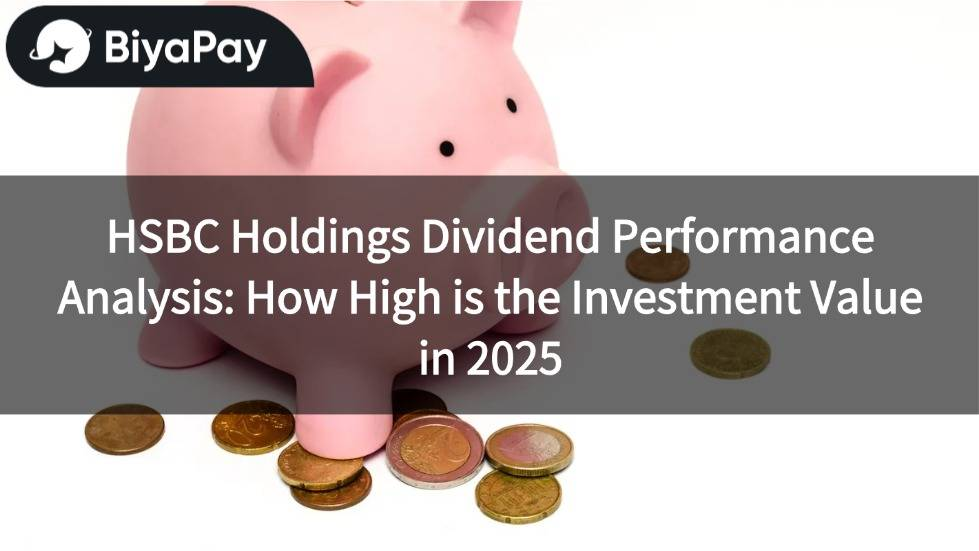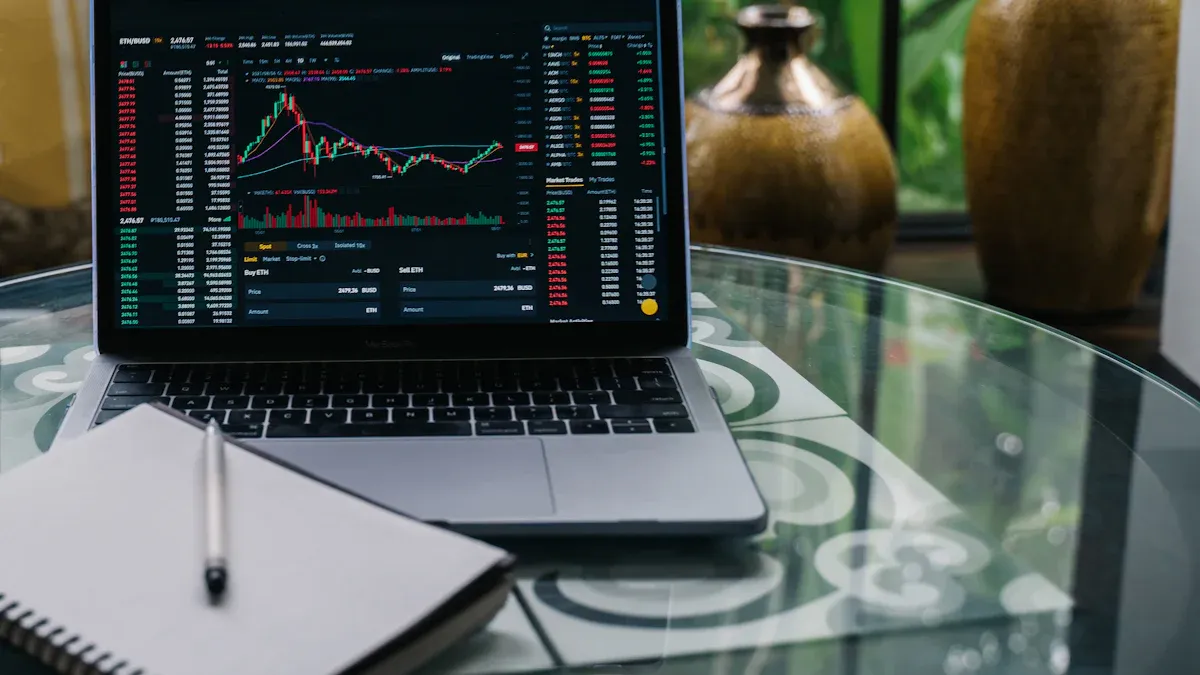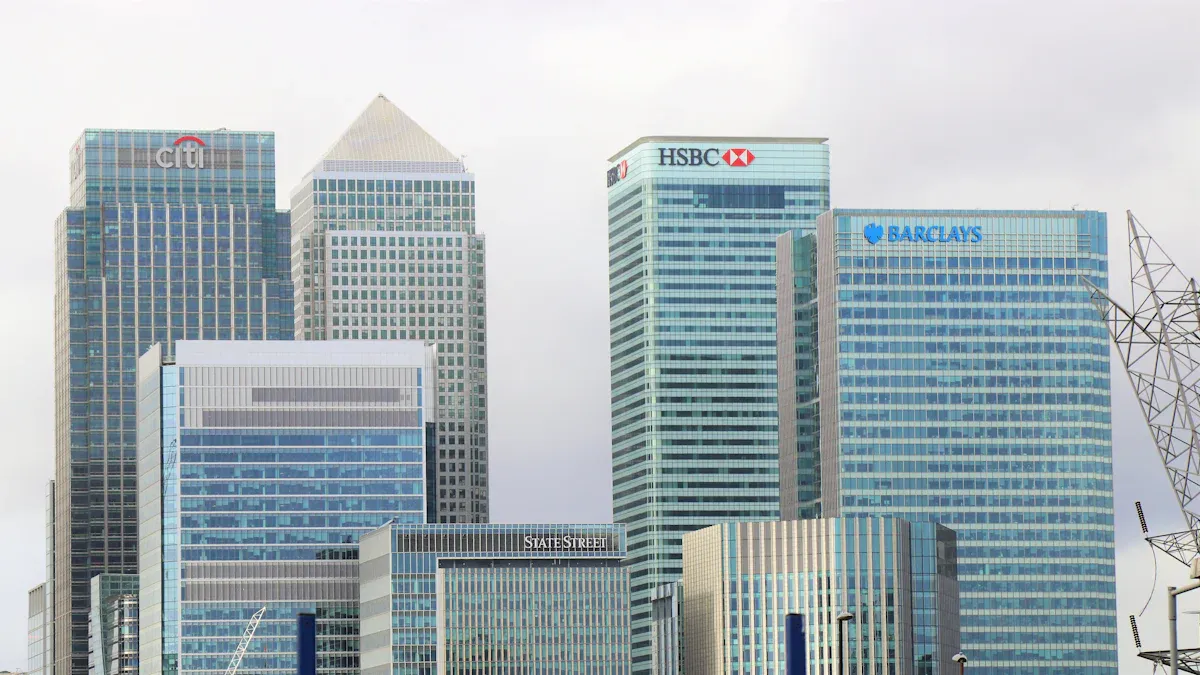- EasyCard
- Trade
- Help
- Announcement
- Academy
- SWIFT Code
- Iban Number
- Referral
- Customer Service
- Blog
- Creator
HSBC Holdings Dividend Performance Analysis: How High is the Investment Value in 2025

Image Source: pexels
In 2025, HSBC’s dividend outlook is expected to remain robust, with a moderately high investment value. The scale of stock buybacks in the Asian market has reached a new high, with return on equity expected to rise to 12%. The dividend yield in Hong Kong and Malaysia reaches 3.9%, significantly higher than the global average of 1.8%. Although China’s GDP is projected to slow to 4.5%, regional profit growth is driving dividend growth above 7%. Investors still need to pay attention to economic variables and market volatility.
Key Points
-
HSBC Holdings’ 2024 dividend yield is approximately 7.7%, with a payout ratio maintained at 50%, demonstrating a robust dividend policy that attracts long-term investors.
-
In 2025, the dividend per share is expected to rise to USD 0.65, with a potential dividend yield of 7.8%, reflecting sustained profit growth.
-
HSBC’s dividend performance surpasses most local and international banks, and its share buyback program helps enhance earnings per share and shareholder returns.
-
Strong economic growth in the Asian market is expected to drive dividend growth above 7%, but investors should remain cautious of economic and regulatory risks.
-
Investors are advised to diversify holdings, regularly review financial reports, monitor ex-dividend dates, and set stop-loss levels to flexibly adjust investment strategies.
HSBC Dividend Status

Image Source: pexels
2024 Dividend Payout
In 2024, HSBC Holdings distributed stable cash dividends to shareholders. The total annual dividend reached USD 0.61 per share (approximately HKD 4.76, based on 1 USD = 7.8 HKD), with a payout ratio maintained at 50%. This ratio reflects the company allocating half of its profits to shareholders. HSBC’s 2024 dividend yield is approximately 7.7%, which is relatively high among Hong Kong-listed banks. The ex-dividend date was August 15, 2024, and the payment date was September 25, 2024. These figures indicate that HSBC Holdings maintains a robust dividend policy, attracting attention from long-term investors.
Experts point out that HSBC’s stable dividends help boost investor confidence, especially during periods of market volatility.
2025 Forecast
The market generally expects HSBC’s dividends to remain robust in 2025. Analysts predict the annual dividend per share could rise to USD 0.65 (approximately HKD 5.07), with the payout ratio expected to remain at 50%. The dividend yield may reach 7.8%, reflecting the company’s sustained profit growth. Management has also indicated that it will continue to target stable dividends, adjusting payout levels based on profitability and capital conditions. Investors should monitor the latest announcements for 2025 ex-dividend and payment dates to make timely arrangements.
Peer Comparison
HSBC’s dividend performance significantly outperforms most local and international banks. The following table compares the 2024 dividend yields of major banks (in USD):
| Bank Name | 2024 Dividend Yield | Payout Ratio | Dividend Per Share (USD) |
|---|---|---|---|
| HSBC Holdings | 7.7% | 50% | 0.61 |
| Standard Chartered | 4.5% | 35% | 0.32 |
| Hang Seng Bank | 6.2% | 55% | 0.78 |
| Citigroup | 3.8% | 30% | 0.56 |
| JPMorgan Chase | 2.9% | 28% | 1.60 |
HSBC Holdings’ dividend yield ranks among the top for Hong Kong banks, significantly higher than major international banks. This reflects the company’s stable profitability and proactive dividend policy. For investors targeting stable cash flow, HSBC’s dividends are highly attractive.
Influencing Factors
Profitability and Capital
HSBC Holdings’ profitability directly impacts dividend stability. In 2024, HSBC recorded strong profits, with a capital adequacy ratio maintained between 14% and 14.5%, well above regulatory requirements. This ratio indicates the company has sufficient capital to withstand market volatility. Management allocates half of its profits to dividends, ensuring stable returns for shareholders. Ample capital also supports future buyback programs, with a 2024 buyback cap of USD 3 billion (approximately HKD 23.4 billion, based on 1 USD = 7.8 HKD).
Management Policy
Management policy has a decisive impact on HSBC’s dividends. The company consistently maintains a 50% payout ratio and flexibly adjusts based on profitability and capital conditions. In 2024, management actively pursued share buybacks, further enhancing earnings per share. These policies help stabilize market expectations and boost investor confidence. Experts believe that a robust dividend policy helps attract long-term capital inflows.
Investors should closely monitor management’s future dividend and buyback guidance, as these signals directly affect the sustainability of HSBC’s dividends.
Economic Environment
The global and regional economic environment poses challenges to HSBC’s dividends. China’s economic growth is slowing, and competition in Hong Kong and Southeast Asia markets is intensifying, potentially affecting profit growth. Changes in U.S. interest rate policies also impact bank interest margins. Nevertheless, HSBC is actively adjusting its business structure, focusing on the Asian market to enhance profitability. If the global economy remains stable, HSBC is expected to maintain high dividend levels.
HSBC Dividend Trends

Image Source: pexels
Management Outlook
HSBC management continues to emphasize a robust dividend policy, with enhancing shareholder returns as a primary goal. In 2025, management expects to maintain a 50% payout ratio, with dividend levels adjusted flexibly based on profitability and capital conditions. Management is also actively pursuing share buyback programs, with a 2024 buyback cap of USD 3 billion (approximately HKD 23.4 billion, based on 1 USD = 7.8 HKD), which helps enhance earnings per share. Management has stated that the Asian market will continue to be a growth engine, particularly in Hong Kong and Southeast Asia. These measures help solidify the stability of HSBC’s dividends and boost long-term investor confidence.
Management has repeatedly emphasized that it will flexibly adjust dividend and buyback strategies based on market changes and regulatory requirements to ensure capital adequacy and stable returns.
Market Forecast
Market analysts generally expect HSBC’s dividends to maintain robust growth in 2025. According to the latest forecast, Asia (excluding Japan) is expected to have an economic growth rate of 4.4% in 2025, significantly higher than the global average of 2.7%. The return on equity in the Asian market is expected to rise from 11.5% to 12%, with profit growth driving dividend growth above 7%. Dividend yields in Hong Kong and Malaysia reach 3.9%, while Singapore and Indonesia are even higher at 4.2%, all surpassing the global average of 1.8%. These figures reflect strong profit momentum in the Asian region, providing robust support for HSBC’s dividends.
- Analyst earnings estimates often have errors exceeding 3%, and such errors occur frequently, significantly impacting stock prices.
- Research finds that estimate errors can be inversely utilized to support contrarian investment strategies, which have a 90% chance of outperforming the market.
- Traditional technical analysis lacks scientific evidence, making it difficult to ensure long-term stable profits.
- Analysts suggest that decisions should be based on objective evidence, as subjective technical analysis methods lack validity.
Investors should cautiously reference market forecasts and make judgments based on their risk tolerance. While HSBC’s dividends have growth potential, market forecasts carry some uncertainty, so a multi-perspective analysis is recommended.
External Factors
External economic and regulatory environments significantly impact HSBC’s dividend trends. China’s economic growth slowdown and intensified competition in Hong Kong and Southeast Asia markets may affect profit performance. Changes in U.S. interest rate policies also impact bank interest margins. Regulatory authorities are imposing increasingly stringent requirements on capital adequacy and dividend policies, requiring HSBC to remain flexible. The strong economic growth outlook in the Asian region offers growth opportunities for HSBC, but investors should remain vigilant of geopolitical and market volatility risks.
Experts advise investors to closely monitor global economic dynamics and regulatory policy changes, flexibly adjusting investment strategies to address potential risks.
Investment Evaluation
Returns and Stock Price
HSBC Holdings has long provided stable returns for investors. Based on backtesting data from 2000 to 2020, HSBC’s annualized return was approximately 19.53%, with monthly returns surpassing the market 57.9% of the time. These figures indicate that HSBC not only offers stable dividends but also has capital appreciation potential. Experts suggest that investors can refer to return on equity (ROE), price-to-book ratio (P/B), and recent one-month stock returns, using a three-factor weighted scoring method to improve stock selection accuracy. Although market volatility is hard to predict, long-term holding of HSBC stock offers a certain advantage in returns.
Buybacks and Market Position
HSBC is actively pursuing share buyback programs, with a 2024 buyback cap of USD 3 billion (approximately HKD 23.4 billion, based on 1 USD = 7.8 HKD). Share buybacks help reduce outstanding shares, boosting earnings per share and further solidifying the company’s leadership position in Hong Kong’s banking industry. With a massive market capitalization and strong capital base, HSBC can flexibly respond to market changes. Management continues to emphasize shareholder returns as a core focus, with buybacks and dividends running in parallel, attracting long-term capital inflows.
Risk Challenges
Despite HSBC’s robust foundation, investors should remain mindful of several risks. China’s economic growth slowdown and intense competition in Hong Kong and Southeast Asia markets may affect profit performance. Changes in U.S. interest rate policies also impact bank interest margins. Additionally, increasingly stringent regulatory requirements demand sustained high capital adequacy levels. Investors should closely monitor global economic and regulatory policy changes, cautiously evaluate potential challenges, and flexibly adjust investment strategies.
Investment Advice
Risk Warnings
Investing in HSBC Holdings offers robust dividends and strong capital backing, but the market still presents several potential risks. Investors should remain vigilant and carefully evaluate the following factors:
Note:
- China’s economic growth slowdown may impact HSBC’s profit performance in the Asian region.
- Changes in U.S. interest rate policies directly affect bank interest margins, influencing dividend capacity.
- Intense competition in Hong Kong and Southeast Asia markets creates ongoing profit pressure.
- Regulatory authorities are imposing increasingly stringent requirements on capital adequacy and dividend policies, requiring HSBC to maintain high capital levels.
- Exchange rate fluctuations also affect actual returns calculated in USD (based on 1 USD = 7.8 HKD).
Investors should closely monitor global economic and regulatory policy changes and flexibly adjust their investment portfolios.
Practical Advice
When investing in HSBC Holdings, experts recommend the following strategies:
- Diversify Investments: Avoid allocating all funds to a single bank stock. Consider holding other major Hong Kong banks like Hang Seng Bank or Standard Chartered to diversify risks.
- Regular Reviews: Review HSBC’s financial statements and dividend announcements quarterly, monitoring profitability, capital ratios, and buyback progress.
- Monitor Ex-Dividend Dates: Pay attention to HSBC’s annual ex-dividend and payment dates, adjusting holdings in a timely manner to capture stable cash flow.
- Set Stop-Loss Levels: Based on personal risk tolerance, set reasonable stop-loss points to avoid significant losses from single events.
- Leverage USD Assets: Consider the hedging benefits of USD assets, appropriately allocating foreign currency assets to reduce exchange rate fluctuation risks.
Investors should flexibly adjust their strategies based on financial goals and risk tolerance, while continuously monitoring HSBC and industry developments.
In 2025, HSBC’s dividend outlook is expected to remain robust, with a moderately high investment value. Investors should make decisions based on their risk tolerance and market dynamics. Future data indicates:
- Return on equity in Asia (excluding Japan) is expected to rise to 12%.
- Profit growth in 2025 is expected to drive dividend growth above 7%.
- Dividend yields in Hong Kong and Malaysia are approximately 3.9%, higher than the global average.
It is recommended to continuously monitor HSBC’s dividends and industry developments, flexibly adjusting strategies.
FAQ
What is HSBC Holdings’ expected dividend payout for 2025?
Analysts expect a 2025 dividend per share of approximately USD 0.65, equivalent to about HKD 5.07 (based on 1 USD = 7.8 HKD).
How does HSBC’s dividend yield compare to other Hong Kong banks?
HSBC’s 2024 dividend yield is approximately 7.7%, higher than Hang Seng Bank (6.2%) and Standard Chartered (4.5%), ranking among the highest for Hong Kong banks.
How can I check ex-dividend and payment dates?
Investors can check the latest ex-dividend and payment date information on HSBC Holdings’ official website or Hong Kong Stock Exchange announcements.
How do HSBC’s share buybacks affect shareholders?
Share buybacks reduce outstanding shares, boosting earnings per share, helping stabilize stock prices, and enhancing shareholder returns.
Do exchange rate fluctuations affect actual dividend income?
Yes. When calculated in USD, HKD-to-USD exchange rate fluctuations directly impact the final dividend amount received.
HSBC Holdings’ 2025 dividend yield is expected to reach 7.8%, appealing to long-term investors, but exchange rate fluctuations may erode USD dividend returns, and high-cost, complex cross-border fund transfers can limit diversification. BiyaPay offers an all-in-one financial platform to optimize global investments! Users can trade US and HK stocks in real-time without an overseas bank account, managing global markets with one account. Remittance fees are as low as 0.5%, covering 190+ countries with same-day fund transfers. The flexible savings product yields a 5.48% annualized return, with daily interest credited automatically. It supports real-time conversion of 30+ fiat currencies and 200+ cryptocurrencies, secured by KYC verification.
Try BiyaPay now to start your global investment journey! Pair it with HSBC dividends and join BiyaPay today at BiyaPay for efficient investing and steady returns!
*This article is provided for general information purposes and does not constitute legal, tax or other professional advice from BiyaPay or its subsidiaries and its affiliates, and it is not intended as a substitute for obtaining advice from a financial advisor or any other professional.
We make no representations, warranties or warranties, express or implied, as to the accuracy, completeness or timeliness of the contents of this publication.




Contact Us
Company and Team
BiyaPay Products
Customer Services
is a broker-dealer registered with the U.S. Securities and Exchange Commission (SEC) (No.: 802-127417), member of the Financial Industry Regulatory Authority (FINRA) (CRD: 325027), member of the Securities Investor Protection Corporation (SIPC), and regulated by FINRA and SEC.
registered with the US Financial Crimes Enforcement Network (FinCEN), as a Money Services Business (MSB), registration number: 31000218637349, and regulated by FinCEN.
registered as Financial Service Provider (FSP number: FSP1007221) in New Zealand, and is a member of the Financial Dispute Resolution Scheme, a New Zealand independent dispute resolution service provider.



















